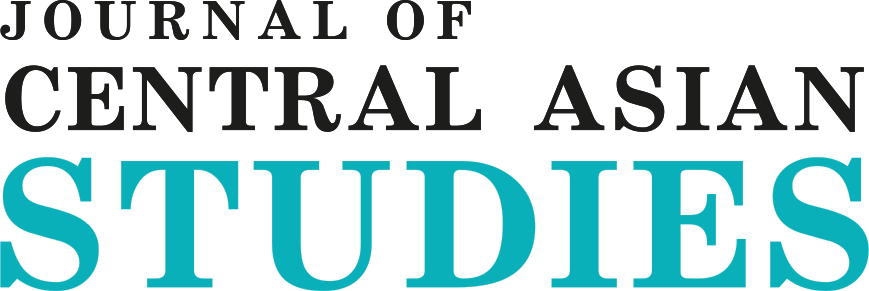Этническая идентичность: исследования ученых Центральной Азии
DOI:
https://doi.org/10.52536/3006-807X.2024-4.003Ключевые слова:
глобализация, религия, этническая идентичность, этническая принадлежность, языкАннотация
Глобализация изменила некоторые аспекты этнической идентичности. В статье теоретически рассматривается анализ исследований этнической идентичности, проведенных учеными Центральной Азии. Поддержание и развитие этнической идентичности в условиях глобализации и социально-политических потрясений является основной темой данного исследования. Рассматриваются различные исследовательские подходы к определению этнической идентичности, основные этапы ее формирования, влияние политических, исторических и социокультурных процессов на формирование и изменение этнической идентичности. Опираясь на исследования из разных дисциплин, таких как антропология, политология, социология и психология, статья углубляется в сложности формирования этнической идентичности, ее значение и ее влияние на отдельных людей и сообщества. Используя данные из 17 научных работ, проиндексированных по ключевому слову «этническая идентичность» в базе данных Scopus, в статье определяются ключевые факторы, влияющие на формирование и понимание этнической идентичности. Автор обобщает различные подходы к изучению этничности, анализирует факторы, влияющие на формирование этнической идентичности, и представляет основные выводы, сделанные исследователями Центральной Азии. Благодаря синтезу эмпирических исследований, теоретических рамок и анализа случаев статья предлагает понимание многогранной природы этнической идентичности в регионе. Статья представляет собой важный вклад в политологию, культурные и социологические аспекты этнической идентичности и может быть использована для дальнейших исследований. Наше исследование раскрывает значительную взаимозависимость между этнической идентичностью и историко-политическими контекстами, показывая, как эти факторы формируют современную социальную реальность. Результаты исследования подчеркивают ценность целостного рассмотрения этнической идентичности и предлагают парадигму для содействия социальной сплоченности и культурной преемственности в Центральной Азии.
Библиографические ссылки
Abdoubaetova, A. (2023). Making sense of conservative narratives in Kyrgyzstan: the case of illiberal public activists. East European Politics, 39(2), 281–300. https://doi.org/10.1080/21599165.2022.2084078
Abdullaev, K. (2012). Nomad migration in Central Asia. In J. Cribb & G. Herrmann (Eds.), After Alexander Central Asia before Islam (pp. 73–98). London, British Academy. https://doi.org/10.5871/bacad/9780197263846.003.0004
Agadjanian, V., & Nedoluzhko, L. (2022). Imperial legacies, nation building, and geopolitics: Ethno-regional divides and the Russian language in Central Asia. Ethnic and Racial Studies, 45(10), 1846–1872. https://doi.org/10.1080/01419870.2021.1981966
Aitpaeva, G. (2008). Kyrgyzchylyk: Searching new paradigms for ancient practices. Anthropological Journal of European Cultures, 17(2), 66–83. https://doi.org/10.3167/ajec.2008.170205
Anderson, B. (2016). Imagined communities: Reflections on the origin and spread of nationalism. London, Verso.
Baigabatova, N., Tolamissov, A., Rakhipova, S., Ashimova, D., Khuangan, O., & Smagulov, K. (2018). Ethnocultural identity of Kazakhs of Mongolia in everyday life. Codrul Cosminului, 24(1), 79–96.
Balci, B. (2007). Central Asian refugees in Saudi Arabia: Religious evolution and contributing to the reislamization of their motherland. Refugee Survey Quarterly, 26(2), 12–21. https://doi.org/10.1093/rsq/hdi0223
Bayarkhuu, D. (2004). Geopolitics of the new Central Asia. World Affairs: The Journal of International Issues, 8(1), 53-76.
Botokanova, G., Alybaev, A., & Mursahmedova, G. (2024). Transformation of the consciousness of post-nomads in the context of globalization. Trans/Form/Acao, 47(2), e0240085. https://doi.org/10.1590/0101-3173.2024.v47.n2.e0240085
Boivin, N. (2015). Peripheral ritualized practices - threads connecting decorations to the cloak of identity. Journal of Intercultural Communication Research, 44(1), 44–63. https://doi.org/10.1080/17475759.2014.1003391
Brubaker, R. (2002). Ethnicity without groups. European Journal of Sociology, 43(2), 163-189. https://doi.org/10.1017/S0003975602001066
Brubaker, R. (2006). Ethnicity without groups. Cambridge, Harvard University Press.
Czuba, K. (2023). Political mobilization of layered ethnic identities. Ethnic and Racial Studies, 46(10), 2138-2162. https://doi.org/10.1080/01419870.2022.2154614
Dave, B. (2007). Kazakhstan - ethnicity, language and power. London, Routledge.
Fahrutdinova, G., Ibrayeva, Z., & Bulatbayeva, K. (2023). Development of multicultural education in Tatarstan and Kazakhstan. Education and Self Development, 18(3), 184–201. https://doi.org/10.26907/esd.18.3.12;
Faranda, R., & Nolle, D. B. (2011). Boundaries of ethnic identity in central Asia: Titular and Russian perceptions of ethnic commonalities in Kazakhstan and Kyrgyzstan. Ethnic and Racial Studies, 34(4), 620–642. https://doi.org/10.1080/01419870.2010.516004
Fierman, W. (2006). Language and education in post-Soviet Kazakhstan: Kazakh-medium instruction in urban schools. The Russian Review, 65(1), 98-116. https://doi.org/10.1111/j.1467-9434.2005.00388.x
Geertz, C. (1973). The interpretation of cultures: Selected essays. New York, Basic Books.
Gharibiyan, Z. (2015). Designing a model for measuring the amount of young individuals’ national identity. Social Sciences (Pakistan), 10(7), 1669–1676.
Hall, S. (1996). Cultural identity and diaspora. In P. Mongia (Ed.), Contemporary postcolonial theory: A reader (pp. 110-121). London, Arnold.
Hirsch, F. (2000). Toward an empire of nations: Border-making and the formation of Soviet national identities. The Russian Review, 59(2), 201-226. https://doi.org/10.1111/0036-0341.00117
Kappassova, G. M. (2018). Migration policy of the regions of the Republic of Kazakhstan: Socio-political mechanisms of easing the interethnic tension. Space and Culture, India, 5(3), 69–88. https://doi.org/10.20896/saci.v5i3.279
Kaziev, S. Sh., Mogunova, M. V., & Kusainov, O. Zh. (2023). North Kazakhstan region: A cult of saints and ethnic identity processes among Kazakhs. Oriental Studies, 16(6), 1572-1586. https://doi.org/10.22162/2619-0990-2023-70-6-1572-1586
Khomyakov, M. B. (2020). Nationalism and colonialism: Oceans, civilizations, races. Changing Societies and Personalities, 4(3), 285–303. https://doi.org/10.15826/csp.2020.4.3.102
Lubin, N. (2023). Islam and ethnic identity in Central Asia: A view from below. In Y. Ro’I (Ed.), Muslim Eurasia: Conflicting Legacies (pp. 53–70). London, Routledge. https://doi.org/10.4324/9781003417088-5
Marat, E. (2018). The politics of police reform: Society against the state in post-Soviet countries. Oxford, Oxford University Press.
Matkerim, D., Ismagambetova, Z., Edelbay, S., Karabayeva, A., & Boldykov, Z. (2023). Symbolic images representing cultural and ethnic identity of the Kazakhs in Kazakhstan cinema. ISVS e-journal, 10(11), 373–389. https://doi.org/10.61275/ISVSEJ-2023-10-11-24
Mukhamejanova, D., & Konurbayeva, Z. (2023). Diaspora engagement and return migration for educational purposes in Estonia and Kazakhstan. International Journal of Comparative Education and Development, 25(2), 123–135. https://doi.org/10.1108/IJCED-07-2022-0055
Murzakhmedova, G., Botokanova, G., & Zhunushalieva G. (2024). Methodological approaches to the study of the Kyrgyz Epic. Southern Semiotic Review, 19, 45–65. https://doi.org/10.33234/SSR.19.4
Myong, S.-O., & Chun, B.-S. (2015). The cultural politics of restoring ethnic identity: Focusing on renaming of streets in Almaty. International Journal of Critical Cultural Studies, 13(2), 1-11. https://doi.org/10.18848/2327-0055/CGP/v13i02/43765
Nasritdinov, E. (2016). Only by learning how to live together differently can we live together at all: Readability and legibility of Central Asian migrants presence in urban Russia. Central Asian Survey, 35(2), 257–275. https://doi.org/10.1080/02634937.2016.1153837
Nurgaliyeva, A., Tastaeva, Z., Baibulsinova, A., & Serikova, L. (2017). The Fire Cult and Islam in the Kazakh system of beliefs. Trames, 21(2), 151–160. https://doi.org/10.3176/tr.2017.2.04
Otpenov, N., Smagulov, K. N., Al’muhametov, A. R., Akimhanov, A., & Anarbaiev, N. (2019). Ethno-confessional conflict as a destructive way to resolve contradictions in social and religious relations. European Journal of Science and Theology, 15(2), 179–189.
Rakhmetova, A., Ayapbergenov, B., Karbozova, G., & Temirgazina, Z. (2022). How much language is important for ethnic identity of young Kazakhstanis from inter-ethnic families? Journal of Siberian Federal University - Humanities and Social Sciences, 15(11), 1573-1584. https://doi.org/10.17516/1997-1370-0937
Reeves, M. (2014). Border work: Spatial lives of the state in rural Central Asia. Ithaca, Cornell University Press.
Senggirbay, M. (2019). Ethnic identity of Kazakhstani Russians: The dynamics of change and the place of Russia as a kin state. Journal of Nationalism Memory and Language Politics, 13(1), 67-89. https://doi.org/10.2478/jnmlp-2019-0004
Shapoval, Y. (2020). The role of Catholicism in the preserving of ethnic identity of deported poles: Case study Kazakhstan. Istoriya, 11(7), 93. https://doi.org/10.18254/S207987840010706-5
Shnirelman, V. A. (2012). Archaeology and the national idea in Eurasia. In C. W. Hartley, G. B. Yazicioğlu, & A. T. Smith (Eds.), The archaeology of power and politics in Eurasia: Regimes and revolutions (pp. 15–36). Cambridge, Cambridge University Press. https://doi.org/10.1017/CBO9781139061186.003
Smith, A. D. (1991). National identity. Reno, University of Nevada Press.
Smith, A. D. (2009). Ethno-symbolism and nationalism: A Cultural approach. Routledge. https://doi.org/10.4324/9780203876558
Torun, N. (2021). Soviet nationality policy: Impact on ethnic conflict in Abkhazia and South Ossetia. Karadeniz Araştırmaları, XVIII(70), 245-263.
Yefremov, Ye. A. (2021). Influence of the multiethnic environment on the diasporic identity of Koreans in Kazakhstan. Vestnik Sankt-Peterburgskogo Universiteta Vostokovedenie i Afrikanistika, 13(4), 519–529. https://doi.org/10.21638/spbu13.2021.404
Загрузки
Опубликован
Выпуск
Раздел
Лицензия
Copyright (c) 2024 Насимов М.

Это произведение доступно по лицензии Creative Commons «Attribution» («Атрибуция») 4.0 Всемирная.










 Open content is licensed under the CC-BY
Open content is licensed under the CC-BY 